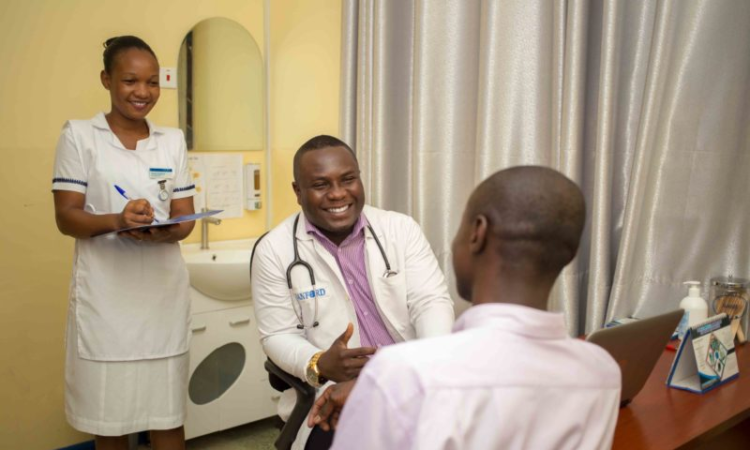
Sanford Health has clinics, facilities and partnerships in nine countries that are aimed at improving health care standards in underserved communities.
Nowhere in this network of Sanford World Clinics is this effort more robust than in Ghana, where Sanford has been making a significant impact by collaborating with the government in addressing the nation’s needs.
This country of 30 million people in western Africa includes five Sanford clinics that employ more than 200 people. They provide crucial care like IV hydration, maternity care, wound care, health education, telemedicine and pharmacy services.
Ultimately, it is an example of providing sustainable health care in areas where there would otherwise be limited access.
“Our presence in the community, first and foremost, raises the level of care,” said Kojo Taylor, president of Sanford World Clinic. “Wherever we have a facility open, it immediately raises the quality of service to the patient. We inevitably become the standard-bearer. We set the threshold of quality of health care.”
The challenges in maintaining that kind of presence are steep. That goes for providers themselves, as well as those responsible for sustaining and managing a workable system within the country.
As senior director of operations for Sanford Health clinics in Ghana, Dr. Sharon Aboagye is dedicated to the cause. He’s also well-schooled in getting positive outcomes from sometimes difficult circumstances.
While Sanford continues to chart a health care path in the region, moving forward will need to include people like Dr. Aboagye, whose association began when he saw an opening that called for a director of implementation. It was for Sanford Health’s first clinic in Ghana.
He has since helped to expand World Clinic Ghana from one clinic to five — as well as many other additional partnerships with existing clinics.
“There is a commitment to making basic things available to our patients,” Dr. Aboagye said. “You realize there is a crisis and you will go to all lengths to make sure that we have things like water — things as basic as infection prevention.”
Above all, running a clinic where people can get necessary medicine and treatment in a timely fashion is not an automatic. And operating clinics that overcome these hurdles demands organization and insight into how it all works.
“We’ve been in Ghana for nine years — it’s really a boots-on-the-ground effort,” said Jim Slack, vice president of Sanford World Clinic. “We’ve seen more than 1.5 million patients in that time.”
The clinics are modeled in some ways similarly to Sanford clinics much closer to the health system’s headquarters in the Midwestern United States. There are obvious differences between a clinic in Kasoa, Ghana, and another in Rock Rapids, Iowa, for instance, but the goals are always ultimately going to be the same.
Initially, the focus was on primary care in Ghana. That is, day-to-day health care for those who are sick or injured. Sanford’s role is expanding, however, to things like maternity care and breast cancer screenings. The clinics are now, in fact, delivering more than 1,500 babies a year.
“We’re just starting to broach into this research area where we’re looking at breast cancer and cervical cancer screening programs,” Slack said. “We’re trying to work with the government to partner with cancer screenings and provide referrals into hospitals. We think we can make a big difference in that role.”
There is another layer of complexity in Ghana when addressing the needs of people who don’t have the means to help pay for their care.
“It’s been difficult,” Slack said. “We’re only reimbursed about $10 per patient visit. How do you try to sustain health care around that? It really isn’t possible to create a sustainable model based on a $10 reimbursement. What we’ve learned, though, is that we need to create a blend of the public and private volumes.”
Sanford has made significant progress on that count.
“We’re not to the end zone yet,” Slack said. “But we’re figuring it out. We’ve arrived at a successful formula.”
The economics of health care is a necessary part of the challenge in Ghana. The core motivation, however, is always the care itself.
“The investments we’re making can’t be quantified by the revenue generated,” Taylor said. “There are many other intangible elements that Ghana benefits from. That’s why I’m very pleased with what we’re accomplishing. It’s why I feel so excited about going to work every day knowing Sanford’s impact is so widespread.”
Dr. Aboagye sees the impact. As a native of Ghana with a family, he knows it’s a vital part of his country’s continued growth and stability.
“We’re able to run independently as a functioning unit in Ghana,” Dr. Aboagye said. “That’s exciting for us. Trying to give people quality care is a privilege. We are helping people get good medicine and treatment. We’re giving them good care that they otherwise wouldn’t get.”
…
Posted In People & Culture, Rural Health, Virtual Care, World Clinic







